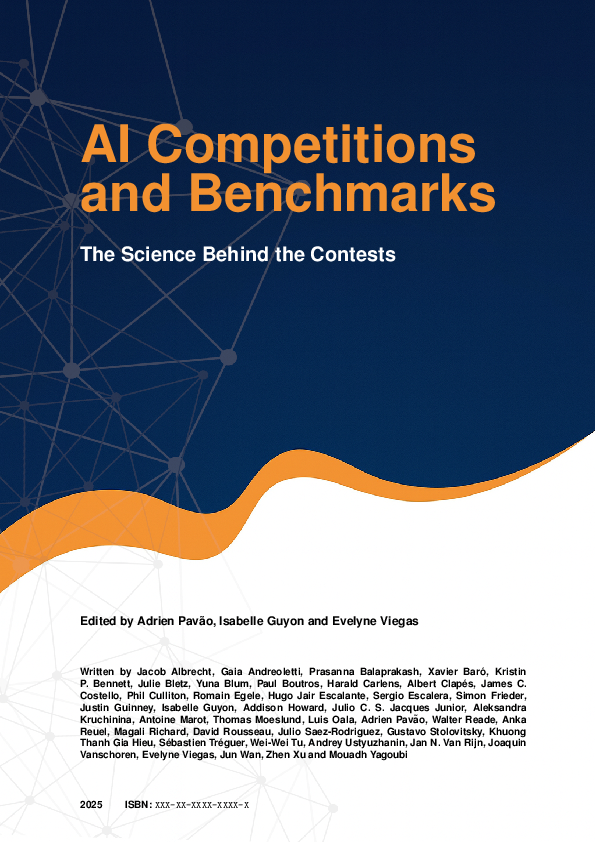Open Access
This book explains how AI competitions and benchmarks are created, run, and used. It brings together lessons from experienced organizers in academia, industry, and non-profits. Covering topics like datasets, evaluation, platforms, and incentives, it shows how challenges drive research, education, and innovation. Designed for researchers, engineers, and organizers, it is a practical guide to understanding and building impactful AI competitions.
Outline
INTRODUCTION
In the rapidly evolving landscape of artificial intelligence (AI), the significance of competitions and benchmarks cannot be overstated. This book provides a comprehensive exploration of the role, design, and impact of AI challenges and benchmarks across academic, industrial, and educational domains. From historical perspectives and design principles to hands-on tutorials, the book offers an invaluable analysis of the organization and execution of AI competitions.
This book compiles insights from experienced challenge organizers, providing guidelines for the effective design of data-driven scientific competitions. The authors represent various institutions from academia, industry, and non-profit.
The book offers critical insights for researchers, engineers, and organizers to develop high impact competitions, through an exploration of dataset development, evaluation metrics, competition platforms, incentives, execution, and practical aspects. By addressing both theoretical and real-world considerations, this book serves as an essential guide for anyone looking to understand, participate in, or organize AI challenges and benchmarks.
Over the last 15 years, challenges in machine learning, data science, and artificial intelligence have proven to be effective and cost-efficient methods for rapidly bringing research solutions into industry. They have also emerged as a means to direct academic research, advance the state-of-the-art, and explore entirely new domains. Additionally, these challenges, with their engaging and playful nature, naturally attract students, making them an excellent educational resource. Finally, challenges act as a catalyst for community engagement by offering a structured and stimulating environment for individuals to collectively work towards a common goal.
This book addresses the gap in the literature on the theoretical foundations and optimization of challenge protocols, which has persisted despite the remarkable successes and progress achieved in challenge organization. It assembles leading experts in challenge organization to provide insights and directions for future research. It also provides a deeper understanding of challenge design, and introduces new methods and application domains for designing and implementing high-impact challenges that advance the frontiers of innovation.
PART I - FUNDAMENTALS
PART II - REVIEWS
Survey of competitions in industry. Use real-world problems to drive innovation, benchmark solutions, and identify talent for research and product development.
An overview of AI benchmarks, from their history and applications to the challenges of reproducibility and the need for robust infrastructure.
PART III - PRACTICAL ISSUES AND OPEN PROBLEMS
Credits
Editors
Adrien Pavão, Isabelle Guyon, Evelyne Viegas.
Authors
Jacob Albrecht, Gaia Andreoletti, Prasanna Balaprakash, Xavier Baró, Kristin P. Bennett, Julie Bletz, Yuna Blum, Paul Boutros, Harald Carlens, Albert Clapés, James C. Costello, Phil Culliton, Romain Egele, Hugo Jair Escalante, Sergio Escalera, Simon Frieder, Justin Guinney, Isabelle Guyon, Addison Howard, Julio C. S. Jacques Junior, Aleksandra Kruchinina, Antoine Marot, Thomas Moeslund, Luis Oala, Adrien Pavão, Walter Reade, Anka Reuel, Magali Richard, David Rousseau, Julio Saez-Rodriguez, Gustavo Stolovitsky, Khuong Thanh Gia Hieu, Sébastien Tréguer, Wei-Wei Tu, Ihsan Ullah, Andrey Ustyuzhanin, Jan N. Van Rijn, Joaquin Vanschoren, Evelyne Viegas, Jun Wan, Zhen Xu and Mouadh Yagoubi.
DMLR editors
[...]
DMLR reviewers
[...]
How to cite this work
If you use this book in your research, please cite it as follows:
@book{pavao2025ai,
title = {AI Competitions and Benchmarks – The Science Behind the Contests},
author = {Adrien Pavão and Isabelle Guyon and Evelyne Viegas and others},
year = {2025},
publisher = {Submitted at DMLR},
url = {https://ai-competitions-book.github.io},
}
 Full Project (PDF)
Full Project (PDF)